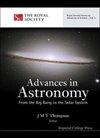Modeling of the Dark Phase of Flight and the Impact Area for Meteorites of Real Shapes
IF 1.2
4区 物理与天体物理
Q3 ASTRONOMY & ASTROPHYSICS
引用次数: 1
Abstract
Aims. The complex dynamics of bodies, originating from the interplanetary matter and passing through Earth’s atmosphere, defines their further position, velocity, and final location on Earth’s surface in the form of meteorites. One of the important factors that affect the movement of a body in the atmosphere is its shape and orientation. Our goal is to model the interaction of real shape meteoroids with Earth’s atmosphere and compare the results with the standard spherical body approach. Methods. In the simulation, we use 3D models of fragments of the Košice meteorite with different sizes and shapes. Using a 3D model of fragments, we consider the real shape of the body to define its resistance properties during atmospheric transition more specifically. The simulation is performed using virtual wind tunnel in the MicroCFD (Computational Fluid Dynamics) software to obtain more realistic drag coefficients and using the µ(m)-Trajectory software to model the particle trajectory in the atmosphere including the wind profile. The final outputs from these programs are the drag coefficient as a function of the altitude and the particle orientation. Using these parameters we get the more realistic body trajectory and the impact area coordinates. Comparison of the results for real and spherical model meteorite impact location is discussed. Results. Simulation showed significant differences in trajectory and the impact area for the different real body orientations compared to the spherically symmetric body. Also, an important result is a difference in the impact area of the real body with a specific orientation without rotation and the body with considered rotation. The significant difference between the modeled impact of a real shape body and its real place of finding compared to a spherically symmetric body indicates the importance of the method used.真实形状陨石飞行暗相和撞击区域的建模
目标天体的复杂动力学,起源于行星际物质并穿过地球大气层,以陨石的形式确定了它们在地球表面的进一步位置、速度和最终位置。影响物体在大气中运动的一个重要因素是它的形状和方向。我们的目标是模拟真实形状的流星体与地球大气的相互作用,并将结果与标准球体方法进行比较。方法。在模拟中,我们使用了不同大小和形状的Košice陨石碎片的3D模型。利用碎片的三维模型,我们考虑了物体的真实形状,以更具体地定义其在大气过渡期间的阻力特性。利用MicroCFD (Computational Fluid Dynamics)软件中的虚拟风洞进行模拟,以获得更真实的阻力系数,并利用µ(m)-Trajectory软件模拟粒子在大气中的运动轨迹,包括风廓线。这些程序的最终输出是阻力系数作为高度和粒子方向的函数。利用这些参数可以得到更真实的物体轨迹和撞击区域坐标。讨论了真实模型与球形模型陨石撞击定位结果的比较。结果。仿真结果表明,与球对称体相比,不同的真实体取向在轨迹和撞击区域上存在显著差异。另外,一个重要的结果是具有特定方向而不旋转的真实物体与考虑旋转的物体的撞击区域的差异。与球对称体相比,真实形状体的模型影响与其实际发现位置之间的显着差异表明所使用方法的重要性。
本文章由计算机程序翻译,如有差异,请以英文原文为准。
求助全文
约1分钟内获得全文
求助全文
来源期刊

Advances in Astronomy
ASTRONOMY & ASTROPHYSICS-
CiteScore
2.70
自引率
7.10%
发文量
10
审稿时长
22 weeks
期刊介绍:
Advances in Astronomy publishes articles in all areas of astronomy, astrophysics, and cosmology. The journal accepts both observational and theoretical investigations into celestial objects and the wider universe, as well as the reports of new methods and instrumentation for their study.
 求助内容:
求助内容: 应助结果提醒方式:
应助结果提醒方式:


